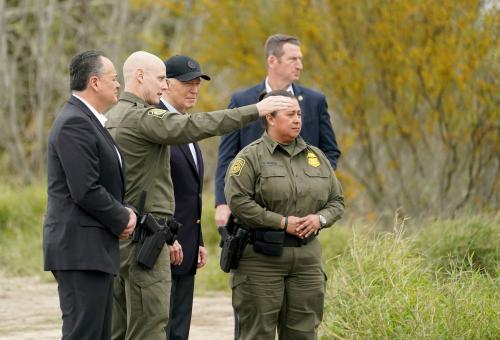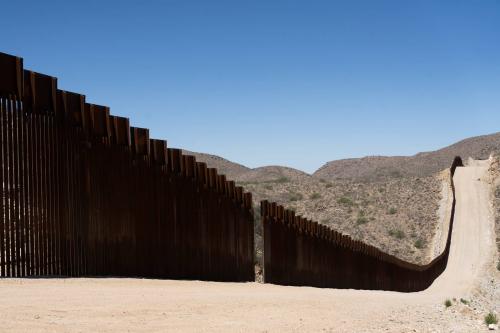The intractability of the immigration issue was never more apparent to me than when I accompanied U.S. Border Patrol agents on midnight rounds along the Mexican border during the 1990s. Without any prompting, dozens of agents—many of whom spend their nights crawling on their bellies to catch illegal immigrants in the dark—told me that if they lived south of the border, they would probably be trying to sneak across as well.
I have seldom, if ever, heard a local police officer express similar thoughts about a drug dealer or petty thief. But such striking ambivalence is not merely the province of those border-patrol agents who express empathy for their targets while pursuing them with cool professionalism; it is an ambivalence that pervades and confounds all aspects of U.S. immigration policy.
It would be easy to dismiss the Bush administration’s proposal for a temporary worker program—unveiled last Tuesday—as purely political, a play for Hispanic and swing voters. Clearly it is that. But it is also breathtakingly daring—a package that, unlike the overtures of previous administrations, does not seek political cover behind high visibility legislative sponsors and reform commissions. Yet for a variety of reasons, the Bush proposal will not work any better than its more politically timid predecessors.
The administration’s package is built on several false assumptions about immigration. The first is that the problems associated with today’s immigrant influx—the largest in American history—are limited to illegals, a relatively small and politically impotent sub-group. As Alan Wolfe cogently documented in his 1998 book, One Nation, After All, ordinary Americans otherwise uncomfortable with making moral pronouncements are not at all reluctant to express moral outrage toward illegal immigrants. Our political elites, when not avoiding immigration altogether, have latched on to this popular framing of the issue. But most consequences of illegal immigration that offend Americans—disorder and transiency in over-crowded neighborhoods, strains on public services, interactions with non-English speakers—are also side effects of legal immigration.
In the same vein, the president’s characterization of undocumented workers as dwelling “in the shadows of American life—fearful, often abused and exploited” may buttress his credentials as a compassionate conservative, but it grossly exaggerates the facts. To be sure, undocumented immigrants working in isolated citrus groves in the South Florida interior or in chicken processing plants in rural Delaware fit this description. Yet such laborers routinely gravitate to urban areas—which is why agricultural interests are always pushing for fresh infusions of foreign labor. Once in the cities, such workers join other immigrants, documented and undocumented alike, in low-paying and arduous service and manufacturing jobs. Without underestimating the difficulty of their travails, I question the White House’s assertion that these undocumented workers constitute “an underclass of workers, afraid and vulnerable to exploitation.” For one thing, these are the people the resurgent labor movement has been organizing with some success (witness, for example, the Justice for Janitors campaign in Los Angeles). How afraid can they be if they are willing to get drawn into a heated organizing drive? Or apply for drivers’ licenses? Or seek admission to the University of California—and then complain about being charged out-of-state tuition! (At least that’s what illegal immigrants did until California—in response to public pressure—amended its laws; now illegal immigrants pay in-state tuition rates.)
We Americans pride ourselves on our flexible, relatively unregulated labor markets. Yet Bush’s plan flies in the face of this tradition. It requires a determination that employers make “every reasonable effort to find an American to fill a job before extending job offers to foreign workers,” and it contains numerous other rules and regulations that will have to be observed—and enforced. In a striking irony that has escaped the notice of both liberals and conservatives, an administration supposedly dominated by market enthusiasts is now proposing the creation of a highly regulated labor market.
More to the point, Americans don’t do this sort of thing well. Just one year ago, the government botched the much simpler job of registering individuals from Muslim countries staying here on temporary visas—causing so many unanticipated detentions and such a public-relations fiasco in the process that the whole enterprise was subsequently abandoned. Americans are so regulation-averse that we have long since stopped asking permanent resident aliens to register annually at the post office.
And even the efficient Europeans have had a difficult time administering temporary worker programs. Germany for example, has found that most supposedly temporary workers never return to their native countries—and eventually bring their families with them. This is because such programs inevitably collide with the realities of immigration. Contrary to oft-repeated claims, employers seek immigrants (both legal and illegal) not simply because they will work for lower wages but also because they are prepared to work more flexibly—at night, on weekends, for short and long shifts—than non-immigrants. Indeed, immigrants provide much needed flexibility that is otherwise lacking in the highly bureaucratic and rights-oriented labor markets of most advanced industrial societies.
Granted, this flexibility arises from the relatively weak position of immigrants, especially illegal immigrants, in the labor market. But it also arises from the immigrants’ own priorities, which are typically to maximize income and minimize expenses. To put it provocatively, to a certain extent immigrants are prepared to exploit themselves.
Such priorities make it unlikely that either employers or employees will be tempted to follow the rules laid out in the president’s proposal. Employees are unlikely to be enthusiastic about paying the proposed registration fee, much less setting aside money in tax-free savings or social security accounts, when their short- and medium-term needs loom so much larger. Employers working under tight deadlines are similarly unlikely to wait for some bureaucrat to approve their hiring of foreign workers.
So non-compliance seems certain—unless the government gets a lot more serious about penalizing offenders. To genuinely enforce the proposed regulations, the government would have to aggressively seek out and deport illegal aliens—as it did during Operation Wetback in the 1950s, which resulted in the forcible repatriation of thousands of illegal Mexican immigrants—while taking strong action against the employers who hire them.
The White House talks of stricter enforcement (though, to be sure, nothing as dramatic as Operation Wetback). But if the will to incur the political and administrative costs of such steps were there, they would have been taken already. Additional rules and regulations—plus continued lax enforcement—will likely prove a formula for more, not fewer, illegal immigrants.
One final irony: If the president’s proposal were somehow to be implemented, temporary workers would, as he emphasized, be able to move back and forth between America and their homeland. However appealing this sounds, it would likely exacerbate the problems Americans associate with mass immigration: transiency and a lack of commitment to becoming part of our national community. But we need not worry. Bush’s bold plan is not going to work—except perhaps politically.


Commentary
Borderline Useless
January 13, 2004